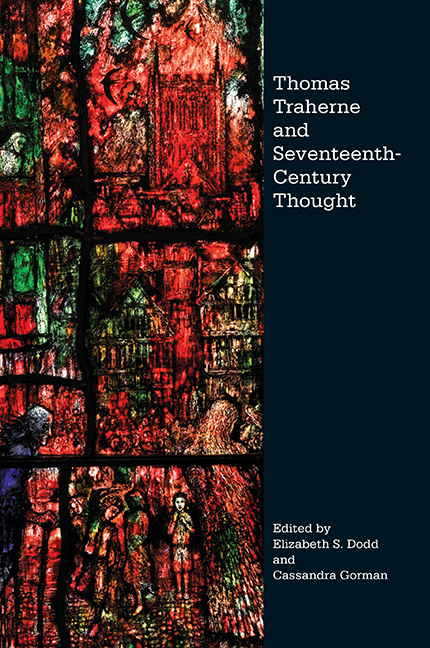Book contents
- Frontmatter
- Contents
- Contributors
- Acknowledgements
- Conventions and Abbreviations
- Foreword
- Introduction: ‘A lover of all Things … An Active ey’ (Select Meditations I.82): Traherne in Context
- PART I PHILOSOPHIES OF MATTER AND SPIRIT
- 1 ‘The Lanthorns Sides’: Skin, Soul and the Poetry of Thomas Traherne
- 2 No Things But In Thoughts: Traherne's Poetic Realism
- 3 Thomas Traherne and ‘Feeling Inside the Atom’
- 4 ‘Consider it All’: Traherne's Revealing of the Cosmic Christ in The Kingdom of God
- PART II PRACTICAL AND PUBLIC DEVOTION
- Afterword by Jacob Blevins
- Chronology of Traherne's Life and Contemporary Intellectual Developments
- Bibliography
- Index
- Index of Biblical References
- Studies in Renaissance Literature
2 - No Things But In Thoughts: Traherne's Poetic Realism
from PART I - PHILOSOPHIES OF MATTER AND SPIRIT
Published online by Cambridge University Press: 05 July 2016
- Frontmatter
- Contents
- Contributors
- Acknowledgements
- Conventions and Abbreviations
- Foreword
- Introduction: ‘A lover of all Things … An Active ey’ (Select Meditations I.82): Traherne in Context
- PART I PHILOSOPHIES OF MATTER AND SPIRIT
- 1 ‘The Lanthorns Sides’: Skin, Soul and the Poetry of Thomas Traherne
- 2 No Things But In Thoughts: Traherne's Poetic Realism
- 3 Thomas Traherne and ‘Feeling Inside the Atom’
- 4 ‘Consider it All’: Traherne's Revealing of the Cosmic Christ in The Kingdom of God
- PART II PRACTICAL AND PUBLIC DEVOTION
- Afterword by Jacob Blevins
- Chronology of Traherne's Life and Contemporary Intellectual Developments
- Bibliography
- Index
- Index of Biblical References
- Studies in Renaissance Literature
Summary
Traherne was a poet preoccupied with things. He liked lists; one critical article refers to his ‘cataloguing style’. Less positively, Christopher Hill complained that ‘Traherne's poems can degenerate into boring catalogues.’ Some lines consist wholly of the naming of parts:
Thy Gifts O God alone Ile prize, My Tongue, my Eys, My cheeks, my Lips, my Ears, my Hands, my Feet (‘The Person’, Ross, VI, p. 41, 63–5.)
Moreover, the words ‘Thing’ or ‘Things’, almost always capitalised, are an unusually frequent and emphatic occurrence in his poetry:
Things fals are forcd, and most Elaborate, Things pure and true are Obvious unto Sence; The first Impressions, in our Earthly State, Are made by Things most Great in Excellence. (‘Ease’, p. 34, 7–10)
Of the seventy-five separate poems in the two major poetic manuscripts, only seven do not contain either word. Yet this raises a critical paradox. It has frequently been considered a flaw in Traherne's poems that they are ‘generic’, ‘diffuse’, and lack a ‘distinctive impression’. One editor claimed that ‘Traherne almost never mentions by name an item of flora or fauna – there are flowers in his poems but no violets or daffodils. [… P]articulars as things in themselves do not interest him.’ Traherne is thus apparently concerned with things both too much and not enough.
The problem is at once aesthetic and philosophical. This essay aims to resolve it by justifying Traherne's repetitive and enumerative attention to ‘things’ as a deliberate strategy, and part of his attention to how philosophical commitments are enacted in genre and rhetoric. This, of course, runs against old cliches that read Traherne's poems as ‘facile, expansive, emotional optimism’, a position much more difficult to hold after the discovery and publication of discursive prose works such as The Kingdom of God and the Commentaries of Heaven. All of the judgements given above were based on limited evidence, through no fault of the critics: they wrote when only a fraction of Traherne's works had been discovered, and fewer published. The prose enables us to place Traherne's poetic – or apparently anti-poetic – ‘things’ in the context both of the Aristotelian grounding of his education, and the rethinking of it by figures such as Francis Bacon and his followers in the Royal Society, with their rallying cry to attend to ‘the things themselves’.
- Type
- Chapter
- Information
- Thomas Traherne and Seventeenth-Century Thought , pp. 48 - 68Publisher: Boydell & BrewerPrint publication year: 2016



